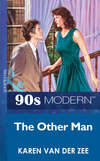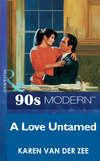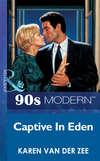Loe raamatut: «The Other Man»
Table of Contents
Cover Page
Excerpt
About the Author
Title Page
Chapter One
Chapter Two
Chapter Three
Chapter Four
Chapter Five
Chapter Six
Chapter Seven
Chapter Eight
Chapter Nine
Chapter Ten
Copyright
“It was finished twelve years ago.”
Aidan’s mouth turned down. “Oh, was it, now?” His voice was low. “Then why did you come to my house?” He moved closer, his eyes locking with Gwen’s.
Gwen’s heart began to beat wildly. He was too damned intimidating. Too male, too overpowering.
“Stay away from me,” she said shakily.
He looked at her with hooded gray eyes. “What are you afraid of?”
Ever since KAREN VAN DER ZEE was a child growing up in Holland she wanted to do two things: write books and travel. She’s been very lucky. Her American husband’s work as a development econo-mist has taken them to many exotic locations. They were married in Kenya, had their first daughter in Ghana and their second in the United States. They spent two fascinating years in Indonesia. Since then they’ve added a son to the family, as well. They live in Virginia, but not permanently!
The Other Man
Karen Van Der Zee

CHAPTER ONE
THE MAN was looking at her, silvery gray eyes probing her face, meeting her eyes. Gwen’s heart stood still. She recognized the eyes, if not the rest of him—the unshaven chin, the longish hair.
Aidan. Her body turned to liquid—she couldn’t feel her limbs and muscles anymore. Couldn’t breathe, couldn’t think. All she felt was a wild, overpowering emotion that made her heart pound and her blood churn through her body. Was it fear? Anxiety? Pain? Oh, God, she thought, don’t let me faint into my soup. Not with a restaurant full of people watching.
Desperately, she sucked in a gulp of air and tried to focus on Joe’s voice rambling on about the book they’d worked on together.
“Yes,” she said, having no idea what she was agreeing to. Her hand clenched rigidly around her soupspoon, she glanced out the window in an effort not to look the other way, at Aidan. The small, rustic restaurant perched on the cliffs overlooking the Pacific and she watched the turbulent waves crashing on the rocky outcrops, spraying up white spume. It was June and the days were long and she’d been looking forward to seeing the sun set, but dark, ominous clouds had gathered in front of the sun and the sky looked bruised and angry. Gwen gave a convulsive shiver. She wanted to go home,
to the safety of her house. But they’d only just been served their food and she couldn’t ask Joe to drive her back so soon. It was nice of him to take her out. He had meant well. You need to get out, Gwen, he had said. You need some time for yourself.
It took all her strength not to glance over at Aidan. She focused her eyes on her food. Concen-trating hard, she ladled in some of her soup—rich, creamy clam chowder. Her favorite soup, soothing and delicious. She was going to choke on it. She put her spoon down, her hand trembling. She couldn’t swallow. She couldn’t breathe.
Twelve years since she’d last seen Aidan. What was he doing here now? She glanced back at him— the need was too strong. There was gray in his hair now, hair that was a little too long and unruly. He looked older, more muscular, tougher. All the polish and shine were gone. Even his silver-gray eyes had a tarnished look about them. His face was brown and more angular than she remembered.
He was with a woman, an attractive woman in her thirties with short black hair and large, ex-pressive eyes. She was talking animatedly, using her hands, looking serious.
His wife.
It shouldn’t hurt, of course. She shouldn’t feel this sharp, jagged jealousy in her chest. She’d known he had a wife for years, but seeing her now made it more real.
My own fault…my own fault…
Aidan turned his head suddenly, as if he’d felt her regard, and again their eyes met. Her heart gave a sickening lurch. She stared, mesmerized, not able to look away from the pale, hypnotic gaze of his eyes.
“Gwen? What’s wrong?” Joe’s voice was worried.
Tearing her gaze away from Aidan, she pushed her chair back. “Excuse me. I’ll be right back.”
Her legs were trembling so much it was a miracle she made her way out of the restaurant dining room and into the ladies’ room without collapsing be-tween the tables. She suppressed an hysterical little giggle, imagining the scene. Leaning on the cold ceramic of the sink, she closed her eyes. Calm down, she ordered herself. Get a grip on yourself. So he’s back. Big deal. Twelve years is a long time. It’s all history now. Think of something else—the book, the baby, anything.
Turning on the tap, she ran cold water over her wrists, splashing water on her silk dress. Periwinkle blue, matching her eyes.
She looked at her face in the mirror. She was ashen and her eyes had a wild, desperate look in them. She closed her eyes and moaned, seeing the man’s face in front of her lids. He looked strange with that dark stubble on his chin, but his eyes she would have recognized in a crowd.
Aidan.
Tears flooded her eyes. “Aidan,” she whispered, wanting to hear his name. “Aidan.”
She didn’t want to feel this way, this terrible pain—a pain full of longing and regret. Where had all that come from so suddenly? So intensely? These feelings shouldn’t have been there anymore; they should have been long gone, fled with time, buried in forgetting.
She had to get back to the table. She couldn’t stay here forever and hide. Swiftly, she pulled a comb through her hair, remembering it had been much longer twelve years ago, remembering Aidan playing with it. In the sun it looks like polished mahogany, he’d once told her, which to her had seemed a wonderfully exotic name for brown. Oh, please, she told herself, stop remembering things! Putting on some fresh lipstick, she willed herself to be calm. Smoothing the long, slim skirt of her dress, she walked out of the ladies’ room, head high.
Aidan. Looking at her. Oh, God. All her fragile control vanished.
He lounged by the large potted palm, hands in his cotton Dockers, looking tall and imposing in the small entryway. Familiar yet alien. Overpow-ering. Dangerous.
He didn’t even look like the man she remem-bered. The beard stubble gave his face something faintly sinister. His clothes were new, but were just the standard cotton trousers and striped, short-sleeved shirt available everywhere. The man she re-membered had worn expensive, designer clothes, had had immaculate haircuts and a clean shaven chin. And a smile in his eyes. There was no smile now. His eyes were a disturbing gray that shrouded darker emotions.
“Hello, Gwen,” he said evenly. “I thought it was you.” His voice, deep, masculine and intimately familiar, slid like expensive brandy through her system—smooth and fiery, spreading a treacherous heat.
It took a moment before she could make her tongue move. “Hello, Aidan,” she returned, hearing the odd, husky tone in her own voice.
For a timeless moment they stared at each other, the heavy silence ripe with old memories and new emotion.
“How have you been?” he asked at last, his tone cool and polite. Yet deep in his eyes she saw a dark turbulence that contradicted the calmness of his face and voice.
“Fine.” She crossed her arms in front of her chest, hugging herself. Cooking smells wafted in from the kitchen—garlic, grilled seafood, some-thing fruity. “I didn’t know you were back.” Of course she didn’t. There was no reason for her to know, no way she could have known. Twelve years had gone by since she’d last seen him and the only information she’d had about him she had found in a newspaper article. As a doctor he’d made an in-ternational name for himself in tropical pediatrics, working with children in hospitals in poor, Third World countries. At the time of the article, he and his wife, also a physician, were heading up an im-pressive medical research project in Asia.
And now he was back in Oregon.
“Just for a few months,” he said. “I’m staying at the summer house.”
His parents’ summer house by the beach, a few miles to the south. Not your average, simple summer cottage, but a luxury beach house high on a cliff with lots of glass affording magnificent views. She’d stayed there, slept in the big bed with him. Was he sleeping in the same bed now with his wife? Don’t think, don’t think.
“How are your parents?” she asked, putting herself on automatic pilot, trying to be polite, steering away from the personal.
“They’re doing well. Just embarked on a cruise around the world.” A small pause. He rubbed his chin, something dark and unfathomable in his eyes. “I understand your mother died.”
He hadn’t liked her mother. She swallowed. “Yes.” She’d become seriously ill a month after Aidan had left the country twelve years ago and had died three months later. “It’s a long time ago,” she added.
Only it didn’t seem like it, not now, standing here, seeing him again. All the feelings were still there, all the anguish, as if it had been days instead of years. How could that be, how could that be?
“Yes,” he said. His gaze swept over her with cool appraisal, taking in her silk dress, the jewelry, her expensive shoes. “Life appears to have treated you well,” he stated. There was no inflection in his voice—his words just a simple, clinical obser-vation, yet the slight, downward tilt of the corners of his mouth gave him away.
“Yes.” It was the truth, yet she could well im-agine the things he was thinking, seeing her like this, knowing what he knew. She swallowed hard, not knowing what else to say, wanting desperately to get away. She felt young again, and awkward and confused and she hated herself for it. She was almost thirty years old, not eighteen.
“I have to go,” she said.
He made a gesture with his hand, indicating the dining room. “Is he your husband?”
So he had known. Somebody had told him she’d married. But obviously his information wasn’t up to date.
She shook her head. “No. Marc…my husband died a year and a half ago.” Her voice trembled. “I’ve got to go.” She didn’t want some polite platitude he’d utter for the occasion. She fled back into the dining room and sat down across from Joe, almost tipping over the wineglass as she reached for it clumsily. From the corner of her eyes she noticed Aidan sitting down again at his own table across from his wife.
“I was about to send out a search party,” Joe commented, his brown eyes searching her face. “Are you sure you’re all right?”
“I’m fine now,” she lied.
“Your soup’s cold.”
“It doesn’t matter. I had most of it. It was de-licious. Now tell me more about your ideas for another book.” She sat back, determined to give him her full attention, determined not to look again in Aidan’s direction.
In August their first book would come out. She had collected the migrant children’s stories and drawings, he had taken the photographs. It was a beautiful, poignant collection eliciting smiles, laughter, anger and tears: the stories of forgotten children.
No matter how hard she tried, her mind was not on the book. She was acutely aware of Aidan sitting only feet away, afraid to look up and see his face, see the woman sitting across from him. Afraid to see some small intimacy—a smile, a hand touching the other’s. Private gestures that had once be-longed to her.
She felt as if she were suffocating. She had to get out of the place, away from Aidan.
She looked up into Joe’s face. “Would you mind terribly if we left? I don’t feel right being gone. I need to get back to the baby.”
It was an excuse, and she felt vaguely guilty. Alice, the baby-sitter, was a nurse and the mother of three healthy grown children. The baby couldn’t be in safer hands.
She managed to leave the restaurant without looking at Aidan. Outside the wind whipped at her hair and clothes and she dragged in a deep breath of the damp, salty sea air. Joe opened the car door for her and she settled herself in the passenger seat.
For a while the road followed the rugged coastline, offering dramatic views of the wild sea and jagged rocks on the one side, and the wooded mountains on the other. Angry clouds streaked through the sky and violent waves tormented the rocks and beaches. Gwen shivered, feeling a sense of foreboding slithering through her.
Half an hour later she was home, the scent of Poison greeting her as she entered the living room. Alice was sitting on the sofa, feet up, dressed in old jeans and a T-shirt stretched tight across her ample bosom. She was doing a crossword puzzle and the television was off.
The baby was asleep, and had been all the time Gwen had been gone, Alice said, looking distinctly disappointed. “I’d hoped for a bit of cuddling,” she added, and gave a long-suffering sigh. Coming to her feet, she gathered her purse and half-finished crossword puzzle. “By the way, do you know a country in Asia that starts with a B? Ten letters.”
Gwen’s heart made a painful lurch in her chest. “Bangladesh,” she said promptly.
“Wow, you’re good!” Alice scribbled in the word and frowned. “You didn’t even have to think about it.”
Gwen shrugged lightly. “Just happen to know.”
Alice left, not fazed by the rain, back to her husband of twenty-seven years. The house was silent. Gwen walked aimlessly around, nervous, tense. A big, beautiful, silent house. Marc had de-signed it for them. He’d been a talented, creative architect who’d designed many beautiful houses for private clients all over the state, Utah and California. Homes built with natural materials that fit the landscape and seemed part of it.
Thunder rattled the windows. She heard the baby cry and ran up the stairs to the room, picking her up out of her crib, holding her close. “It’s all right,” she whispered. “I’m here, don’t cry.” She stroked the dark hair, kissed the soft, warm cheeks. The small body squirmed against her, as if fighting a frightening dream. She felt so light, so fragile-much too small for a child of eight months. A lump formed in her throat and she felt overwhelmed by love and tenderness and fear.
She switched on a small light and changed Churi’s diaper. She warmed a bottle of milk and sat in the rocking chair, feeding the baby until she fell back to sleep. She sat there for a long time, cradling the warm body against her breast, while tears ran soundlessly down her cheeks.
“I lied, Aidan,” she whispered. “I lied.”
CHAPTER TWO
“YOU LOOK awful,” Alice informed her the next afternoon. “What are you having done? A root canal?” She’d come over to baby-sit Churi while she had her nap so Gwen could go to the dentist. Gwen had planned it that way; she’d be back by the time Churi would be awake again. It made her uneasy to be away when Churi was awake.
“Just a regular cleaning and checkup. I’m fine.” Gwen made a casual gesture. “I just didn’t sleep well.”
Alice grimaced. “That storm was a zinger. The whole house was rattling.”
Gwen grabbed her keys and purse and made for the door before Alice would ask more questions. It had not been the storm outside that had kept her awake, rather the storm inside her head that had prevented her from sleeping.
It was a wonderful sunny June day and she opened the roof of the Porsche and drove away. Signs of the storm’s destruction were everywhere. The sprawling, neatly manicured gardens around the luxury houses located off the wooded road looked disheveled from the storm’s onslaught. Branches and twigs had been ripped off the trees and shrubs and littered the grass. Blooms lay broken and wilted in the flower beds.
Inside Gwen felt as ravished as the gardens. A tight knot of tension in her stomach was growing ever larger. All she’d been able to think about was Aidan, think about that night, twelve years ago, remember the look in his eyes, the sound of his voice, her own.
“Tell me you don’t love me!” Aidan’s hands hard on her upper arms, eyes wild. “Tell me, dammit!”
Anguish searing through her. “All right! All right! I don’t love you!” Tears running down her face. Sobs racking her body. “I don’t love you! I don’t love you!”
She stared blindly ahead of her at the curving road. “Stop it!” she said to herself. “Just stop it!”
It was not good for the baby for her to be so upset. Churi would feel her distress and there’d been enough distress in her short little life. Gwen bit her lip and clamped her hands hard around the steering wheel. She had to resolve this situation, fast, come to terms with the avalanche of memories and emo-tions that threatened to take over. She needed to be calm. For her own sake, for Churi’s sake. She needed to slow down.
She slowed down, realizing she was on the main road out of town, not even knowing how she’d gotten there. Oh, Lord, her dentist appointment! Too late now. Never mind. She was in no shape to sit in a dentist’s chair—quiet, docile, her mouth open, sterile instruments and gloved fingers probing her teeth. She might bite off a finger, or scream. They’d carry her away in a straitjacket. She groaned. A little Valium might not be a bad idea, dentist or no dentist.
It was not a conscious decision to go to the small cove, but an unknown force propelled her there. She parked the car off the road, close to the bushes. The narrow trail was still there, hidden by tangled growth, and muddy from the rains. She clambered down toward the small crescent of deserted beach strewn with debris the waves had tossed up onto the sand the night before. She took off her shoes and dug her toes in the cool sand, wondering why she had come back here now after all these years. Why she was opening herself up to memories that might be better left hidden.
They’d made love on this beach, in the silver light of the moon, with soft breezes cooling their heated bodies. Nights of magic and romance and love.
For a moment she fought the urge to flee, then slowly she lowered herself in the sand and drew up her knees. It was just the way it had been so many years ago: the same sand, the same ocean, the same rocks.
Nothing was the same.
The wind swept her hair back from her face and she closed her eyes, smelling the salty air, hearing the screech of sea gulls. She tried to think of peaceful things. The wind felt good. It came across miles of ocean, from tropical islands with beautiful flowers and palm trees. Hawaii, maybe.
It didn’t work. She wasn’t in some tropical paradise. She was here, in Oregon, a paradise in its own right with its magnificent wild coast, its ma-jestic, rugged mountains and deep, verdant forests.
And Aidan Carmichael. Aidan Carmichael whom she’d loved so passionately a long time ago.
Aidan in the summer house. Just down the road. She should go see him and get the madness out of her system. Maybe this sort of madness was per-fectly normal. After all, he’d been her first true love. He’d been the first man she’d ever made love to and that sort of thing left an impression on a girl’s psyche and soul, or so the books said. Usually a bad one, according to statistics.
But it hadn’t been bad for her. For her it had been magical.
He’d been caring and loving and gentle. She pressed the heels of her hands against her closed eyes. It was better not to think about this now. It was better to leave it buried like a wonderful treasure—to know it was there, but not to look at it. To leave it hidden in the shadows of the past.
A strand of hair blew across her mouth and she wiped it away. It had been a shock to see him again. Of course it had been, but she could get over it, surely. She was not eighteen any longer. All she had to do was go talk to him and it would be clear that the past was the past and what had been then was over now.
He was a different man now, famous in his field, older, different. And she was different, so different from that frightened, insecure girl she had once been. Talking to him would exorcise the ghosts of the past, the memories, the feelings. He was a stranger now with a life of which she was no part. Once she’d spent a few minutes with him it would become clear that nothing was left of the past and her peace of mind would be restored.
She got to her feet before her courage failed her, clambered up the rocky trail to the place where she had parked her car.
Down the road she went, her heart in her throat, the wind whipping at her hair. Please, please, she prayed. Make all this go away. Make me not feel all these feelings. Please give me back my peace of mind.
She stopped at the narrow path that led to his house hidden in the woods. The weathered wooden mailbox was overgrown with morning glory, the name only barely legible on the side.
She lowered her head on the steering wheel, swamped with trepidation. What if his wife was there? What if…What would she say to him? I just came to see that I’m really not affected by you anymore. You have changed. I have changed. Life goes on. That’s the way it should be.
I came to say I’m sorry.
Please forgive me.
“Gwen?”
She jerked her head up, heart turning over. Aidan stood by the side of her car, looking down at her. He was bare-chested, wearing only shorts and running shoes, and every inch of his brown ex-posed skin gleamed with perspiration. His broad chest was lightly covered with dark hair and he was breathing hard. His sleek, muscled body was the picture of male vitality and strength, exuding a rugged, elemental virility. She smelled the scent of pine and tangy sea air and the earthy scent of warm, damp skin.
He wiped his forehead with a blue-and-white striped sweatband wound around his wrist. “Here we meet again,” he said, and his deep voice stroked her nerves and tingled through her blood.
Her throat went dry. She swallowed, unable to produce a sound, knowing she was staring at him wide-eyed, looking stupid, her hair wild and wind-blown. She must look like a madwoman. She felt like a madwoman.
His eyes swept over her red convertible, his face faintly mocking. “Nice car,” he said, his voice carefully bland.
Nice car was an understatement, of course. It was a luxurious, expensive vehicle, a dream come true for many people. Marc had given it to her for her birthday two years ago. She hadn’t asked for it. It had never occurred to her to want a luxury sports car. And she’d never wanted the expensive jewelry and beautiful presents Marc was always giving her. “Please,” she’d say time and time again, “you don’t need to give me all these expensive things. It’s not me, Marc. You already give me everything I need.” Once, he’d looked at her with eyes full of dark emotion. “Really?” he’d asked, and her heart had constricted at the anguished tone in his voice. Even now the memory made her heart ache.
He had not stopped giving her gifts.
“Have some fun,” he had said when he’d pre-sented her with the Porsche. “Live a little.”
She remembered the words, but she couldn’t re-member his face. Panic surged through her. She couldn’t remember his face! How could she not re-member the face of the man to whom she’d been married for more than ten years? All she saw was Aidan—the light eyes in the dark face, the square, stubbled chin, the hard chest. All she was aware of was the disastrous effect he was having on her nervous system and the terrible hunger deep inside her.
“Something wrong?” Aidan asked.
She swallowed again, glancing away at her hands, trembling in her lap, her tongue paralyzed. She shook her head.
“I need something to drink,” he went on when she remained silent. “Come on up and join me.” Matter of fact. Casual. As if she were a friend, a neighbor. Yet behind the calm words she sensed a subtle command. He was used to having his way, to be obeyed. There was a sense of authority about him that seemed more pronounced than she re-membered. It was there in the way he held his body, the enigmatic face, the cool look in his eyes.
She nodded, not sure why. One part of her wanted to run, the other part wanted to do as he suggested. Her hand trembled as she put the car into drive and turned into the path, following Aidan as he jogged up to the house. Powerful legs, broad shoulders. He was a well-constructed running ma-chine, well-proportioned. She watched the smooth movement of his muscles beneath the tanned skin of his back and legs and felt her mouth go dry. Why couldn’t she have found him wearing baggy sweats?
She parked the car by the side of the house. Aidan opened the door for her and with a sweeping gesture indicated the back door of the house that led into the kitchen. The front door was never used, she remembered, only when strangers rang the bell.
The big, eat-in kitchen had changed little. It was light and bright with casual but expensive wooden furniture and was updated with the latest appli-ances. Not your average summer cottage this was, furnished with castoffs and attic furniture. Only the best for the Carmichaels. How awed and impressed she’d been by the family’s wealth when she’d been younger. How young and unsophisticated she had been…Sometimes, looking back, it amazed her how much she had changed, how much she had matured.
The windows had a view of wooded, rugged rocks jutting out into the wide expanse of ocean. She heard the call of sea gulls and the roaring of the waves.
He stood by the sink and splashed water on his face and neck, then dried off with a flowered kitchen towel he pulled out of a drawer.
“You look different,” she said, knowing she sounded inane, saying it just to break the awkward silence.
He shrugged as he filled two tall glasses with ice and water. “So do you.”
Of course she did. She was twelve years older. And a lifetime wiser. She searched her mind to think of something else to say. “Where were you working, before coming here? Bangladesh, still?”
“No, Ecuador. I left Bangladesh three years ago.” He handed her one of the glasses.
He gulped down the entire glass of water, then refilled it. She watched his hands work the tap. Big hands capable of gentle touch. Swiftly, she forced the thought away.
He turned back to her, regarding her with un-fathomable eyes. “Why did you come here?” he asked casually, tipping back his glass and drinking more water.
The question she dreaded. “I…” She gestured helplessly, scrambling for words, for a light touch. “I suppose just out of ordinary curiosity.” She managed a breezy smile. “To see how you’d fared after all these years.”
He cocked one dark eyebrow. “Really?” A single word, a thousand hidden meanings.
She sipped at her water. “Why are you staying here?” she asked. “Vacation?”
He pushed his damp hair away from his forehead. “No. I’m here to finish a book about my research project. Then I’m going back to Ecuador.” He placed his empty glass back on the counter.
“Are you ever planning to come back home for good?”
He leaned lazily against the counter, his arms crossed in front of his chest. “Not a great need for tropical pediatrics in the temperate Northwest, is there?” Faint amusement in his voice.
She shrugged lightly. “No. But I suppose you could teach or write, or both.”
“I’d rather practice medicine, with a little writing on the side for a change of pace.”
They were having a calm, simple conversation, yet she felt shaky with tension. There was so much she wanted to say, so much to explain, but she could not find the words. Her mind seemed to have shut off, as if overloaded with emotion and stress. Then again, why would it matter to him at this point? He had the life he wanted and a wife who shared it, and the past did no longer matter. She wondered where his wife was.
“And what are you doing with yourself these days?” he asked politely.
She moistened her lips. “I’m a teacher. Kinder-garten. Five-year-olds.”
His eyes narrowed slightly. “Really?”
Had she seen a glimpse of surprise in his eyes? She nodded. “I…I love it. It’s vacation now, though, so I’m not working,” she went on, feeling ridiculously nervous, as if she were making an un-comfortable confession. “Usually I volunteer in the summer and work with special programs for mi-grant kids, but…eh, not this time.”
Why was she saying all this? Because she wanted his approval, to show him she was not merely a lady of leisure, driving a Porsche and living off her deceased husband’s money. She was a person in her own right, a person who had matured and made something of herself.
He studied her. “You look good,” he said bluntly. “You lost that scrawny look.”
To her mortification, heat rushed to her cheeks. She’d been thin at eighteen, working too many hours, eating too little food. She’d filled out a little in the past twelve years, she knew. She’d gained some weight and rounded out in all the right places.
“I’m not a teenager anymore,” she said, as if he didn’t know. Why did she have to sound so stupid?
The years of separation yawned between them. How did she bridge that gap of time—all the events and changes that had taken place in the years stretching between then and now? Was it even possible? Did she want to?
“You’re a woman now,” he agreed, his gaze sliding over her body with seeming clinical as-sessment. Hidden behind the cool gray something stirred that set off a tingling in her body.
Her heart throbbed in her throat. She swallowed painfully. “I was very young when we knew each other, Aidan.” It was more than a statement—it was a plea for his understanding.
Tasuta katkend on lõppenud.



















